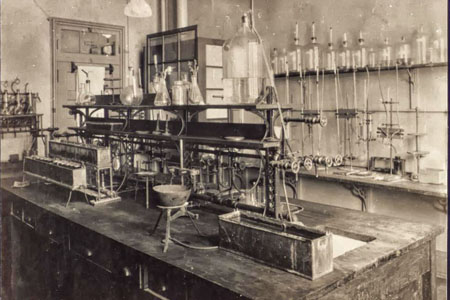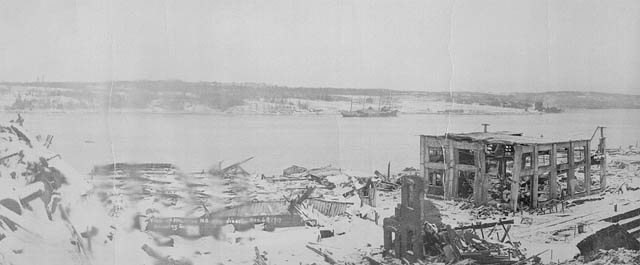Edwin Albert Baker, CC, OBE, MC, co-founder of the Canadian National Institute for the Blind (CNIB) (born 9 January 1893 in Ernestown Township, ON; died 7 April 1968 in Collins Bay, ON). After he was blinded as a soldier during the First World War, Baker was motivated to create employment opportunities and training for people who were blind (see Blindness and Visual Impairment). In 1918, he co-founded the CNIB, a national non-profit organization. As managing director, Baker championed rights and broadened research and awareness of blindness. His work was recognized by prominent figures around the world.
First World War
Edwin Albert Baker was born in 1893 in historic Ernestown Township (near present-day Kingston, Ontario). He graduated from Queen’s University with a degree in electrical engineering, and enlisted with the 6th Field Company, Royal Canadian Engineers to serve during the First World War. Shortly after arriving overseas, Baker was blinded by a sniper bullet while standing in a trench in Mount Kemmel, Belgium. Baker, who attained the rank of Lieutenant with the Royal Canadian Engineers, later recounted the event in the 1960s during an interview with author Marjorie Wilkins Campbell: “A German star-shell lit up the desolate landscape… as I watched, a bullet smashed through the bridge of my nose and left me to the mercy of the darkness and my friends.”
He recuperated at St. Dunstan's Hostel for Blind Soldiers and Sailors, based in London, England. Baker was inspired by meeting the hostel’s founder, Sir Arthur Pearson, who embraced a philosophy of self-reliance, an idea that was considered novel at the time. For Pearson, soldiers and sailors who were blind could enjoy their lives and become more active members of society by empowering themselves through different types of training. At St. Dustan’s, Baker learned skills including braille, business administration, fencing, piano, and sculling.

Baker and the founding of the CNIB
Upon his return to Toronto in 1916, Edwin A. Baker worked as a Dictaphone typist for the Hydro-Electric Power Commission of Ontario. (See also Sir Adam Beck.) But his focus shifted to advocating for returning veterans, who were newly blinded, and who had limited options for employment and training. Baker immersed himself in the cause, routinely speaking at fundraisers and Victory Bond rallies (see Victory Loans). He volunteered for the Toronto-based Canadian Free Library for the Blind and joined its board of directors.
On 6 December 1917, an unforeseen event encouraged Baker and others to take concrete action and help individuals living with blindness. On that day, a French ammunition ship struck another vessel and exploded in Halifax harbour (see The Halifax Explosion and the CNIB). Along with many deaths, hundreds of people suffered vision loss from the accident. The tragedy highlighted the inadequacy of rehabilitation services and the need for additional resources to support blind people in Canada. Seven board members of the Canadian Free Library for the Blind, including Baker, came together to establish a national organization. In 1918, the Canadian National Institute for the Blind (CNIB), was established in Toronto. The goal of the non-profit, philanthropic organization was “to serve the blind people of Canada and to prevent blindness.” (See also Blindness and Visual Impairment.)
Advocacy
Edwin A. Baker was hired by the Canadian government as a consultant for the war blinded in 1918. He also served as managing director of the CNIB from 1920 to 1962. Under his leadership, a large-scale survey of Toronto schoolchildren was organized, that led to the creation of sight-saving classes that assisted children with visual disabilities who were at risk of visual deterioration. The retired honorary lieutenant colonel arranged for Indigenous peoples living in remote areas to receive eye examinations. He personally manufactured wooden and felt snow goggles that were given to Arctic residents. Baker also encouraged the Canadian government to treat people with ophthalmia neonatorum, a bacterial infection that affects newborns.
Eugenics
More controversial was Edwin Baker’s support for the voluntary sterilization of individuals with congenital (hereditary) eye diseases. Evidence of Baker’s views regarding sterilization have been examined by author and former CNIB President and CEO, Euclid Herie, in Journey to Independence: Blindness, the Canadian Story (2005). In the 1930s, Baker and the CNIB were lobbied by A.F. Kaufman of the Parents’ Information Bureau about voluntary sterilization. Excerpts of a 1938 letter reveal that Baker strongly opposed general sterilization of the blind but would “heartily support” sterilization “where any blind person’s loss of sight was ophthalmologically certified as due to hereditary conditions or social disease which might, in any way, be transmitted to offspring.” Herie states that within a year of writing the letter, Baker authorized the CNIB to “cover the costs of having four blind men sterilized.”
Baker (and Kaufman) were not alone in their support for sterilization. Eugenics, a set of beliefs and practices aimed at improving the human population through controlled breeding, influenced opinion and the enactment of sexual sterilization laws in North America during the early 20th century (See Eugenics in Canada). In 1928 and 1933 respectively Alberta and British Columbia passed sexual sterilization laws. Other Canadian provinces drafted sexual sterilization legislation, but the legislation was not passed by government.
Global impact
Edwin A. Baker was recognized for his work in Canada and abroad. During the 1939 Royal Tour, Baker was presented to King George VI at the National War Memorial in Ottawa. By the 1940s, Baker was among the world’s leading advocates for people who were blind. When a new residence for war-blinded soldiers opened in Toronto in 1944, it was named Baker Hall in his honour. Baker was also instrumental in the establishment of the World Council for the Welfare of the Blind (WCWB). He was blessed by Pope John XXIII for many years of work as president of the WCWB. The WCWB evolved into the World Blind Union, located in Toronto. In 1956, the CNIB’s new head office opened on Toronto’s Bayview Avenue, named BakerWood, honouring Baker and Lewis Wood, a past president of the CNIB.

American connection
Edwin A. Baker’s influence was so vast that he was elected president of the American Association of Workers for the Blind, from 1939 to1941. For a time, Baker served as trustee of the American Foundation for the Blind. On 12 June 1951, blind crusader Helen Keller presented Baker with the Migel Medal for Outstanding Services to the Blind. This award from the AFB honoured “those whose dedication and achievements have significantly improved the lives of people with vision loss.” When presenting Baker with the Migel Medal, Helen Keller gave a speech and told Baker “…you are one of the “warriors of the sighting brain” who are pilot-stars of humanitarianism.” Ten years later, Baker became the first recipient of the Helen Keller International Award for Outstanding Service to the Blind, given by the American Foundation for Overseas Blind. Baker was also appointed as a member of a US Army honorary advisory committee following the Second World War.

Edwin Baker died on 7 April 1968 in his home in Collins Bay, Ontario. In a 1968 obituary, A.N. Magill, the CNIB’s managing director, was quoted as saying that Baker was “A man who transformed a disability into a success.” An Ontario Heritage Trust plaque commemorating Baker’s life stands near his birthplace. Decades after his death, Baker was inducted into the Hall of Fame of the Leaders and Legends of the Blindness Field, located at the American Printing House for the Blind in Louisville, Kentucky, in 2002.

Honours and Awards
- Military Cross
- Croix de Guerre (1916)
- Officer, Order of the British Empire (1935)
- Migel Medal for Outstanding Services to the Blind, American Foundation for the Blind (1951)
- Helen Keller International Award for Distinguished Service to the Blind, American Foundation for the Blind (1960)
- Companion, Order of Canada (1967)
- Hall of Fame, Leaders and Legends of the Blindness Field, American Printing House for the Blind (2002)
- Inductee, Loyalist Hall of Honour, United Empire Loyalists’ Association of Canada (2020)

 Share on Facebook
Share on Facebook Share on X
Share on X Share by Email
Share by Email Share on Google Classroom
Share on Google Classroom





